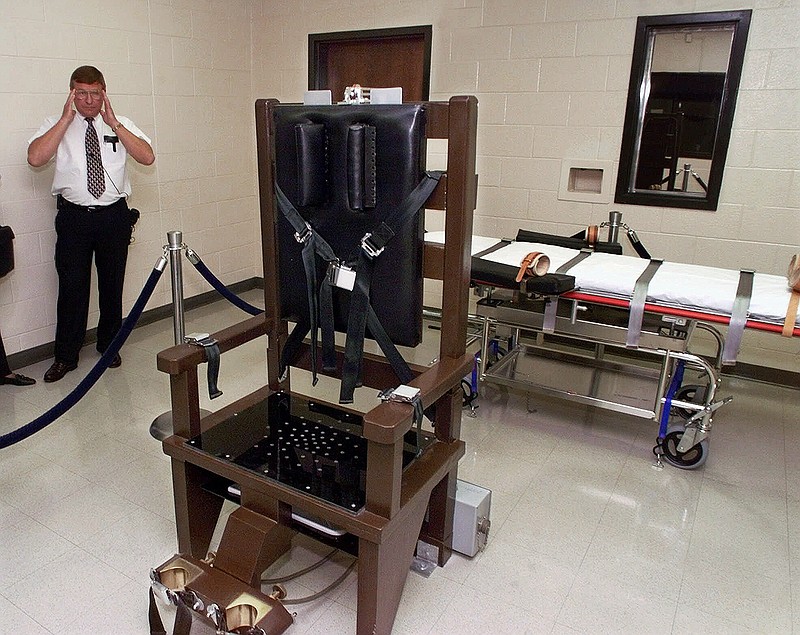NASHVILLE - Tennessee Attorney General Herbert Slatery has asked the state Supreme Court to set execution dates for nine more death row inmates, including Harold Wayne Nichols of Chattanooga, a serial rapist convicted in the 1988 brutal rape and first-degree murder of a Hamilton County woman.
Slatery's filing, which comes at a time when many states are backing away from capital punishment, caught federal public defenders by surprise.
It follows on the heels of Slatery's successful push to set execution dates for eight death row inmates, five of whom have been executed.
Kelley Henry, the supervisory assistant federal public defender for the Middle District of Tennessee, said the office only "learned of the request for mass executions late yesterday after receiving the requests in the mail. Seven of the nine are represented by my office. All of the remaining Davidson county cases are included in the request."
Henry said in her statement that her office is "surprised by the request for mass executions. Each case is unique and represents a number of fundamental constitutional problems including innocence, racism, and severe mental illness. We will oppose the appointed Attorney General's request."
Slatery's office said in a later statement that the motions were filed "on behalf of the Tennessee Department of Correction and as required by Tennessee Supreme Court Rule 12.4 (A), moved to set execution dates in nine capital cases.
"In each of these cases, decades have passed since juries in multiple districts across the State sentenced the defendants," Slatery's office's statement said. "All of the defendants have now concluded the standard three-tier appeals process and each case has been thoroughly litigated in the state courts and on federal review through the United States Supreme Court."
The attorney general's office also noted the Tennessee Constitution "guarantees victims of crime the right to a 'prompt and final conclusion of the case' after the conviction of sentence."
Last year, Tennessee was second only to Texas in executions. There were just 25 executions carried out nationwide in 2018, according to the Death Penalty Information Center. Tennessee carried out three of them.
Nichols was convicted in a Hamilton County court in 1992 for the Sept. 30, 1988, rape and first-degree murder of Karen Pulley in the Brainerd section of Chattanooga. According to the Tennessee Supreme Court's 2002 ruling that upheld his sentence, Nichols broke into a home where he found Pulley alone in an upstairs bedroom.
After forcibly removing Pulley's clothing, Nichols raped her and struck her in the head with a board he had found in the home. After the rape, Nichols struck the victim in the head with the board at least four more times as she struggled, according to the court's ruling.
Pulley died of blunt trauma as a result of skull fractures and massive brain injuries.
The other eight men Slatery is moving to execute are:
- Byron Black, convicted of murder in the 1987 slayings in Nashville of his girlfriend Angela Clay and her two daughters, Latoya and Lakeisha Clay. He was sentenced to die for the death of Lakeisha Clay and received two life sentences for the other killings.
- Tony V. Carruthers, convicted of first-degree murder in the 1994 slayings in Memphis of Marcellos Anderson, Delois Anderson and Frederick Tucker. He was sentenced to death in all three cases.
- Henry Eugene Hodges, who pleaded guilty to first-degree premeditated murder and aggravated robbery in the 1990 slaying of Ronald Bassett in Nashville.
- Donald Ray Middlebrooks, convicted of torture and murder in the 1987 slaying of 14-year-old Kerrick Majors in Nashville. The state Supreme Court reversed the death sentence in 1992, ordering the case back to trial court for resentencing in which Middlebrooks was eventually given a second death sentence.
- Farris Genner Morris, convicted of murder in the 1997 slayings of 15-year-old Erica Hurd and James Ragland in Jackson, as well as the rape of Angela Ragland. Jurors sentenced him to death for Hurd's killing.
- Pervis Tyrone Payne, convicted of murder for the 1987 deaths in Memphis of Charisse Christopher and her 2-year-old daughter Lacie. He was sentenced to death for each of the killings. Payne also was convicted of intending to murder Christopher's 3-year-old son Nicholas.
- Oscar Franklin Smith, who was convicted of murder in the 1989 triple slayings of his estranged wife Judy Lynn Smith and her two sons from a previous marriage, Chad and Jason Burnett, in Nashville. He was sentenced to death for all three killings.
- Gary Wayne Sutton, who was convicted of first-degree murder in the 1992 slaying of Tommy Griffin in Blount County. A jury sentenced Sutton to death.
In Tennessee, executions are carried out through lethal injection unless the drugs are unavailable, in which case the electric chair is used.
Additionally, death row inmates who were convicted of crimes before January 1999 can choose the electric chair or lethal injection. Tennessee put 56-year-old Stephen West to death in the electric chair last month. West was convicted of the 1986 kidnappings and stabbing deaths of a mother and her 15-year-old daughter. He also was convicted of raping the teen.
Slatery, a former corporate attorney and legal counsel to then-Gov. Bill Haslam, was appointed state attorney general by the Tennessee Supreme Court in 2014.
It was widely viewed in political circles at the time as a favor to Haslam, who had refused to join fellow Republican and then-Lt. Gov. Ron Ramsey, the Senate speaker, who unsuccessfully sought to defeat the three Democratic justices on the five-member court during their retention elections earlier in 2014.
The Associated Press contributed to this story.
Contact Andy Sher at asher@timesfreepress.com or 615-255-0550. Follow on Twitter @AndySher1.
